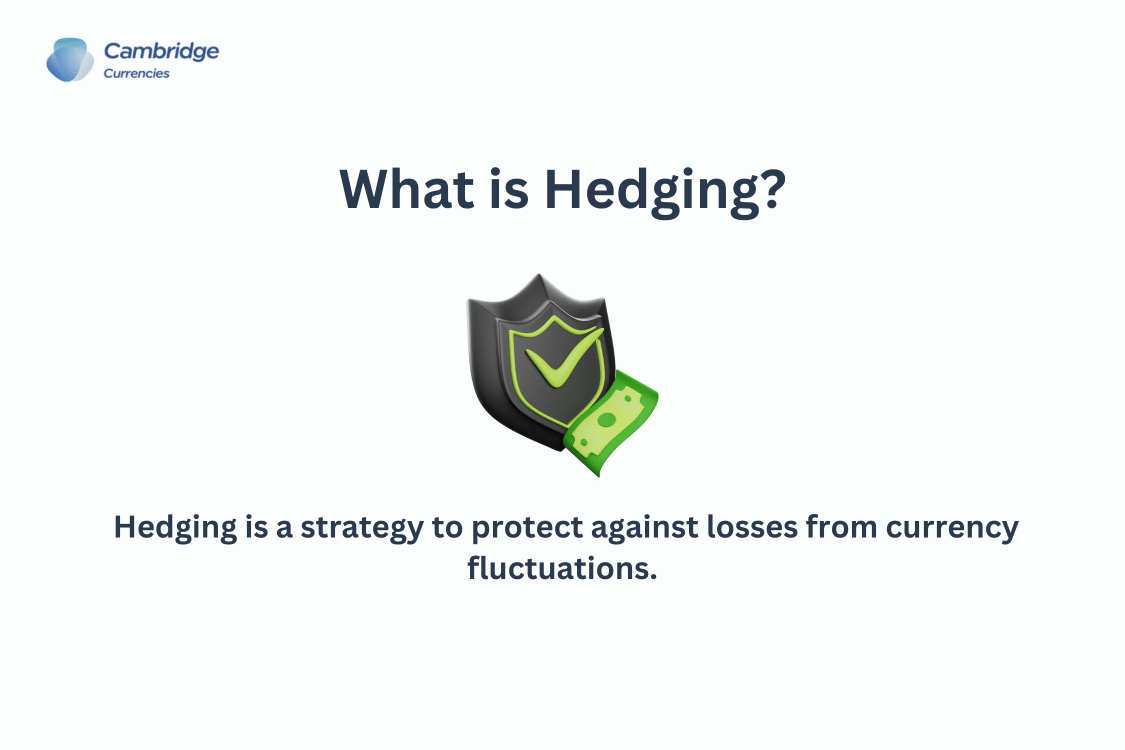FX Hedging Strategies: How to Limit Volatility and Hedge FX Risk Effectively
23rd July 2024 – Tags Forward Contracts, Spot Transfers, Market Insights

Foreign exchange (FX) markets are notorious for their volatility. For businesses managing large sums across borders, even minor currency fluctuations can have a significant impact on their bottom line. To limit this risk, FX hedging strategies are essential, ensuring that businesses can protect their profits from unfavourable market movements. At Cambridge Currencies, we specialise in timing the market. We help businesses hedge large amounts of money. This protects against volatility and improves overall financial stability.
In this guide, we’ll dive deep into FX hedging. We will discuss popular strategies. We will also explore how businesses can effectively manage their exposure to currency risk. Whether you’re a corporate treasurer or a business owner, this comprehensive article will help you understand FX hedging better. It will explain how it can benefit your business.
What Is FX Hedging and Why Is It Important?
At its core, FX hedging refers to the practice of protecting your business against fluctuations in foreign exchange rates. This involves taking financial positions that offset any adverse movements in the currency markets. For businesses handling international transactions, FX risk can be significant. This is particularly true when dealing with large sums or contracts that extend over a long period.

Companies can implement hedging strategies. This ensures their future cash flows or expenses are not dramatically affected by swings in exchange rates. In many cases, the goal is to create certainty. This allows companies to accurately budget and forecast their financial performance. They can do this regardless of the FX market’s ups and downs.
How to Hedge FX with Options?
One of the most popular methods of hedging foreign exchange risk is using FX options. These financial instruments give businesses the right to exchange currency at a predetermined rate. Businesses are not obligated to do so on a specific date. This flexibility is crucial. It allows businesses to benefit if the exchange rate moves in their favor. They are still protected if the rate shifts negatively.
Example: Using FX Options for Hedging
Imagine you’re a UK-based company expecting to receive €1,000,000 in three months. Currently, the GBP/EUR rate is favorable. However, there’s concern that the euro might weaken. This could reduce the value of the payment when converted to GBP. By purchasing an FX option, you lock in a rate that protects you from unfavorable moves. If the euro strengthens, you can let the option expire and benefit from the better rate.
What Is the Best Hedging Strategy for FX?
There’s no one-size-fits-all solution when it comes to hedging foreign exchange risk. The best FX hedging strategy depends on several factors. These factors include the size of your business, the volume of your transactions, and your appetite for risk. Here are some of the most common strategies used by businesses:
- Forward Contracts: This is one of the simplest and most widely used hedging strategies. A forward contract locks in an exchange rate for a future transaction. It guarantees that a specific amount of foreign currency will be exchanged at a fixed rate, regardless of market movements. Read more about Forward Contracts (here)
- FX Swaps: An FX swap involves exchanging two currencies at a predetermined rate on one date. The transaction is then reversed at a later date, at either the same rate or a different one. This approach is often used to manage cash flow or liquidity needs while hedging foreign exchange exposure.
- Corporate FX Hedging Strategies: Larger businesses with more complex exposure to currency risk often adopt corporate FX hedging strategies. These might involve a combination of forward contracts, options, and swaps tailored to the specific risks faced by the company. Read our Business Guide (here).
The FX Hedging Approach: How We Help Businesses at Cambridge Currencies
At Cambridge Currencies, we take a consultative approach to FX hedging. We work closely with each client to understand their unique currency exposures. We create a tailored hedging strategy that aligns with their financial goals. Our approach involves:
- Market Timing: We help businesses time the market to lock in favorable rates for large transactions. This allows them to protect their profits from volatile market shifts.
- Customized Solutions: Every business is different. That’s why we don’t believe in cookie-cutter solutions. You might be managing payments across multiple currencies. Alternatively, you may need to hedge a large one-off payment. We’ll create a solution just for you.
- Risk Mitigation: Our goal is to limit your exposure to risk. We also aim to give you the flexibility to benefit from positive market movements.
Options to Hedge Foreign Exchange Risk
There are several options to hedge foreign exchange risk. Understanding which is best for your business is crucial for successful FX management. Here’s a breakdown of the main tools available:
- FX Forwards: As mentioned earlier, these allow businesses to lock in an exchange rate for a future date. They are simple, but effective, particularly when the goal is to achieve cost certainty.
- FX Options: If your business is exposed to more volatile currencies, consider using FX options. They provide the flexibility to hedge against adverse movements. These options also allow room for favorable market shifts.
- Cross-Currency Swaps: For companies with exposure to multiple currencies, cross-currency swaps help hedge against fluctuations. These fluctuations occur between two foreign currencies. This strategy reduces overall risk.
- Natural Hedges: While not a financial instrument, many businesses with global operations adopt natural hedging strategies to offset risks. They balance costs and revenue in the same currency.
Hedging FX Risk in Practice
Let’s say a UK-based company is set to pay a supplier in the United States $1,000,000 in six months. The business is concerned that the USD/GBP exchange rate will become unfavorable. By entering into a forward contract, the business can lock in the current rate. This guarantees that the cost of the payment won’t increase. This remains true regardless of what happens in the market.
On the flip side, if the company expects to receive a large payment from a customer in USD, it could use an FX option. This ensures they get the best possible conversion rate. This strategy is beneficial when the time comes.
Frequently Asked Questions:
FX hedging is the process of protecting your business from unfavorable currency movements. It’s crucial for businesses dealing in foreign currencies. Even small fluctuations in exchange rates can lead to significant financial losses.
The FX hedging approach varies depending on your business’s exposure to currency risk. At Cambridge Currencies, we offer a personalized approach. We help businesses mitigate risk. Our goal is to achieve financial stability through market timing and customized hedging strategies.
The main options include forward contracts, FX options, cross-currency swaps, and natural hedges. Each has its advantages, and the best option depends on the specific needs and goals of your business.
Why Cambridge Currencies for FX Hedging?
At Cambridge Currencies, we understand the complexity of managing currency risk in today’s global economy. Our team of experts provides personalized guidance and tailored FX hedging strategies designed to protect your business from market volatility. Whether you’re looking to hedge a one-off transaction or manage ongoing exposure to multiple currencies, we’re here to help.
Get in touch today to learn how we can help you limit FX volatility and safeguard your financial future. Get a call back
Protect Your Transactions with Hedging
Hedging helps safeguard your business from unpredictable currency fluctuations. By locking in exchange rates, you ensure your profits aren’t impacted by volatile markets. Whether you’re managing international payments or large contracts, hedging strategies provide stability.
To see current exchange rates, use our currency converter. It provides real-time rates tailored to your needs. Explore how hedging can benefit your business.
